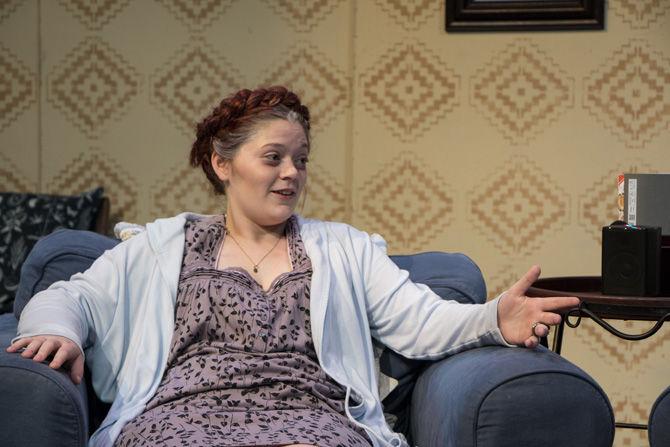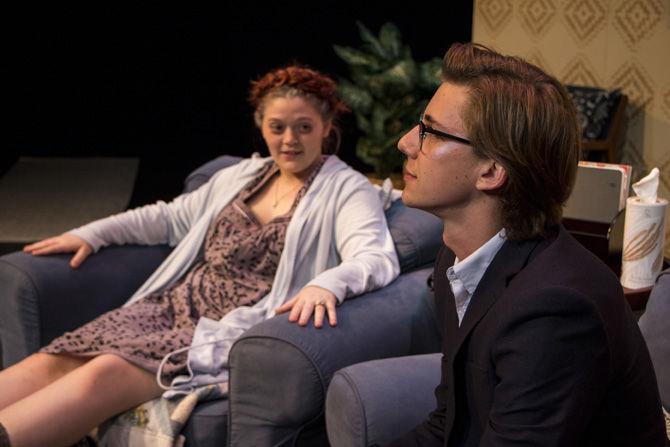The University’s Lab Theatre explores loss, pain and the limits of artificial intelligence in its latest production, “Marjorie Prime.”
“Marjorie Prime,” running through Sunday, follows 85-year-old Marjorie as she struggles to maintain her mental faculties near the end of her life. The Pulitzer Prize-nominated show is set in the near future and explores humanity’s interactions with artificially intelligent holograms.
The holograms, known as primes, take on the form of lost loved ones as a therapeutic treatment to combat memory loss, grief and loneliness.
In the Jordan Harrison play, Marjorie interacts with a prime of her deceased husband, Walter, while her daughter Tess and son-in-law Jon grapple with the technology’s limits to ease human suffering and the morals of altering memory.
Each prime relies on what they are told or observe to effectively simulate the presence of their human counterpart, making it possible for characters to alter what is remembered and how a person’s history is perceived.
The primes are a key coping mechanism in the play’s society, but the limits of their usefulness are evident, said theater freshman Savannah Sanders, who plays Marjorie.
The technology can’t always help dull or resolve the most difficult aspects of the human experience, and that’s a realization the characters must come to throughout the play’s duration, said theater PhD candidate and director Rachel Aker.
Sanders said she walked away from the experience with a greater appreciation for her memories and time spent with loved ones.
“To me, it’s a cautionary tale of technology and how far we’re using it as a crutch to help us deal with being alive,” she said.
The ability to alter personal histories also raises interesting ethical questions, said theater senior Kasey Cañas, who plays Tess. Cañas said the ethics of altering memories are complex, especially when changing details may help ease another person’s pain.
Despite exploring science fiction ideas, the play is grounded in human moments and a strong undercurrent of emotion, said interdisciplinary studies junior Phillip Moran, who plays Jon. The play, billed a drama, is largely contemporary and reflects how everyday people find humor amidst pain while struggling through life’s dramas, he said.
Aker said the themes of loss and navigating grief are universal, making the play accessible to a college audience despite the advanced age of the characters.
“We’re in a community that experiences loss,” Aker said. “We don’t know what loss you might have experienced, between grandparents, parents, flooded homes…all kinds of things happen in this community. It’s an important story to tell.”
-
Theatre senior Kasey Canas (Tess) and interdisciplinary studies junior Phillip Moran (Jon) act out a living room scene from Marjorie Prime in the Studio Theater located in LSU’s Music and Dramatic Arts building on Wednesday, Sept. 28, 2017.
-
Interdisciplinary studies junior Phillip Moran (Jon) and theatre freshman with a focus in performance Savannah Sanders (Marjorie) act out a living room scene from Marjorie Prime in the Studio Theater located in LSU’s Music and Dramatic Arts building on Wednesday, Sept. 28, 2017.
-
Theatre freshman with a focus in performance Savannah Sanders (Marjorie) act out a living room scene from Marjorie Prime in the Studio Theater located in LSU’s Music and Dramatic Arts building on Wednesday, Sept. 28, 2017.
-
Interdisciplinary studies junior Phillip Moran (Jon) and theatre freshman with a focus in performance Savannah Sanders (Marjorie) act out a living room scene from Marjorie Prime in the Studio Theater located in LSU’s Music and Dramatic Arts building on Wednesday, Sept. 28, 2017.
-
Interdisciplinary studies junior Phillip Moran (Jon) acts out a living room scene from Marjorie Prime in the Studio Theater located in LSU’s Music and Dramatic Arts building on Wednesday, Sept. 28, 2017.
-
Interdisciplinary studies junior Phillip Moran (Jon) and theatre senior Kasey Canas (Tess) act out a living room scene from Marjorie Prime in the Studio Theater located in LSU’s Music and Dramatic Arts building on Wednesday, Sept. 28, 2017.
-
Interdisciplinary studies junior Phillip Moran (Jon) and theatre freshman with a focus in performance Savannah Sanders (Marjorie) act out a living room scene from Marjorie Prime in the Studio Theater located in LSU’s Music and Dramatic Arts building on Wednesday, Sept. 28, 2017.
-
Theatre freshman with a focus in performance Savannah Sanders (Marjorie) acts out a living room scene from Marjorie Prime in the Studio Theater located in LSU’s Music and Dramatic Arts building on Wednesday, Sept. 28, 2017.
-
Interdisciplinary studies junior Phillip Moran (Jon) and theatre senior Kasey Canas (Tess) act out a living room scene from Marjorie Prime in the Studio Theater located in LSU’s Music and Dramatic Arts building on Wednesday, Sept. 28, 2017.
-
Theatre freshman with a focus in performance Savannah Sanders (Marjorie) and biology freshman Jacob McManus (Walter) act out a living room scene from Marjorie Prime in the Studio Theater located in LSU’s Music and Dramatic Arts building on Wednesday, Sept. 28, 2017.
-
Theatre senior Kasey Canas (Tess) and interdisciplinary studies junior Phillip Moran (Jon) act out a living room scene from Marjorie Prime in the Studio Theater located in LSU’s Music and Dramatic Arts building on Wednesday, Sept. 28, 2017.
-
Theatre senior Kasey Canas (Tess) and interdisciplinary studies junior Phillip Moran (Jon) act out a living room scene from Marjorie Prime in the Studio Theater located in LSU’s Music and Dramatic Arts building on Wednesday, Sept. 28, 2017.
-
Interdisciplinary studies junior Phillip Moran (Jon) and theatre freshman with a focus in performance Savannah Sanders (Marjorie) act out a living room scene from Marjorie Prime in the Studio Theater located in LSU’s Music and Dramatic Arts building on Wednesday, Sept. 28, 2017.





























